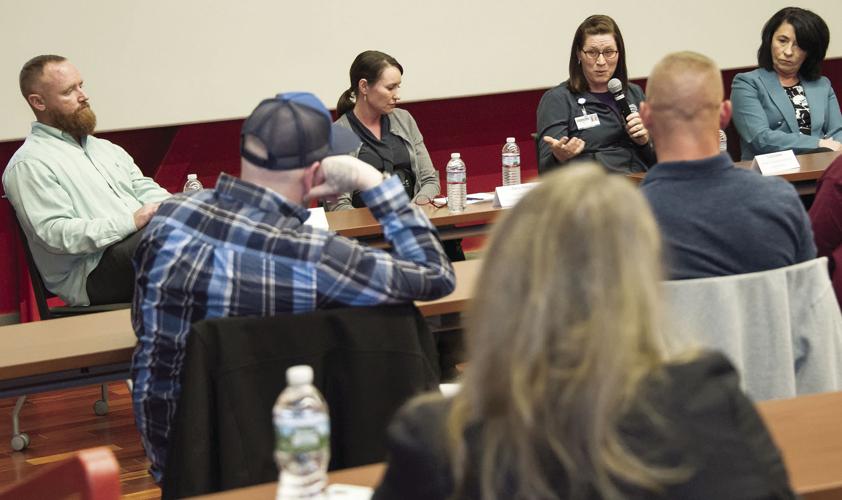LACONIA — Ryan Buell started drinking to escape his mental health problems. Scott Leighton started taking drugs because he feared getting sick. And Jessica Sherkanowski became an addict after a doctor prescribed and then abruptly stopped medication to help her cope with pain following a bad car accident.
Just as there are many different reasons people get caught up in substance abuse, so there are many different paths to recovery.
That message was repeated over and over during a program that brought together clients in recovery from drug and alcohol addictions with treatment providers and counselors for an open discussion about the services for those struggling with addiction.
About 50 people attended the Community Conversations program held at Lakes Region Community College's Academic Commons.
The two-hour session was moderated by Community College President Dr. Larissa Baia, and Laconia Daily Sun reporter Rick Green, whose recent Paths to Recovery series spotlighted personal accounts of the descent into the throes of addiction and the efforts to re-emerge through recovery.
Recovery is not a once-and-done experience, clients told the audience, and addiction is often not the only problem facing people with addiction issues.
“It’s not just a disease. It’s a disease on a continuum,” said Daisy Pierce, executive director of Navigating Recovery of the Lakes Region. “There’s no one-size-fits-all. Everyone’s addiction is different.”
Buell, who is in the recovery program at Riverbank House in Laconia, told the gathering he has been in 12 to 15 different recovery centers all over the country.
“Depression and anxiety were the biggest roadblocks to getting myself into recovery,” he said of his experiences. Riverbank’s long-term program, he said, has been critical to his progress. “The support (of the other people in the program) is very important to me.”
Most of Riverbank’s client stay for a minimum of six months,” Mike Metz, the facility’s program director, said. “We see an array of people in very much need of help.”
Medication-assisted treatment – which combines behavioral treatment with medication – is crucial for some people suffering from substance abuse disorders
“The medication-assisted program is helping to change lives,” said Dr. Margaret Bahder, a local psychiatrist. Many of her patients are taking Suboxone as part of their treatment. She said the drug is used as part of a “very structured program” which has “very consistent” results. “The success rate is much higher with medication-assisted treatment than just with abstinence.”
Sherkanowski, who has been in a medication-assisted program since 2016, said the treatment has been a godsend.
“It’s OK to be on medication-assisted treatment,” she said. “Our brains have changed too much (because of the drugs), and we need that extra push.”
Corey Gately, director of substance abuse services for LRGHealthcare, concurs.
“The disease of addiction creates brain issues,” she said. “We find a lot of people who find medication is a beginning. It’s not switching one drug for another.”
While people like Sherkanowski got into medication-assisted treatment while under the care of a psychiatrist, others may be getting their first medication through the new Doorway program at Lakes Region General Hospital, which works with walk-ins as well as people referred by the state’s 2-1-1 health services crisis line.
“Medication-assisted therapy can begin in the emergency room,” Gately, said.
Some people, like Tasha Sargent, are on Suboxone, which reduces a person’s cravings for opioids and helps reverse the effects of opioids and eases withdrawal symptoms.
“Suboxone keeps my pain at bay,” said Sargent, who said she has suffered through trauma her whole life. “I may be on Suboxone for the rest of my life,” she said.
Bahder said some of her patients are now taking much smaller doses of the drug than before, but are afraid of going off the medication entirely.
Others at the forum said there are other avenues which have been critical to their recovery.
Ara, a resident at Riverbank House in Laconia who didn't want his last name used, said self-improvement and belief in a higher power have been very important for him.
“I’m not OK with being just OK,” he said. But with self-reflection and developing more of spiritual awareness, “I’m (learning to be) OK with being OK.”
Many panelists in recovery said for recovery to be effective, people with addictions have to take on the challenge because it is vital to them, not to please someone else.
“If I didn’t love myself, I wouldn’t be able to do things the right way,” said Tara Galvin, who was raised by a single mom who herself was a drug addict.
That may not happen until an addict feels that things have become hopeless.
That moment came for Sherkanowsi, who “hit rock bottom” when she was in jail and even her mother would not post the $75 bail to get her released.
“I needed for everyone to give up on me — until I reached my low,” she recalled. “My mother needed to walk away from me. I needed to do it for me,” she said.
Though drug abuse is a daunting challenge, there are many places in the Lakes Region where those who are addicted can get help.
“We are not anywhere worse off here (than the rest of the state),” said Gately. “We have a lot of good communications with our partners. We do a lot of good work here. We have been ahead of the curve in a number of ways.”



















(0) comments
Welcome to the discussion.
Log In
Keep it Clean. Please avoid obscene, vulgar, lewd, racist or sexually-oriented language.
PLEASE TURN OFF YOUR CAPS LOCK.
Don't Threaten. Threats of harming another person will not be tolerated.
Be Truthful. Don't knowingly lie about anyone or anything.
Be Nice. No racism, sexism or any sort of -ism that is degrading to another person.
Be Proactive. Use the 'Report' link on each comment to let us know of abusive posts.
Share with Us. We'd love to hear eyewitness accounts, the history behind an article.